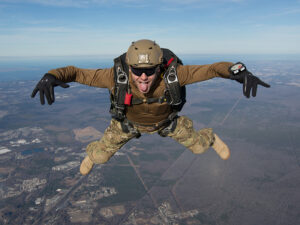How to stay calm and carry on, according to a bomb defusal expert
Bomb defusal experts are known for staying calm in crises. While most of us will never face a bomb, their advice can help manage stress. Here’s how.
As a former special operations officer with the United States Navy, Daniel Glenn has endured his fair share of maintaining calm in a crisis.
Research shows calmness allows you to manage your energy better as your sympathetic nervous system is not working overtime, enabling you to focus on what needs to be done more efficiently.
Racing armed Iranian sailing vessels in the Persian Gulf? Daniel has done it.
Handling hypothermia in the Himalayas? Tick.
Playing high-stakes games with foreign intelligence officials? Tick.
But it was working as a bomb defusal expert for the navy where Daniel’s perspective of staying calm – and his ability to do just that – really paid dividends.

How stay-calm training pays off in daily life
Describing himself as a person who’s naturally good at slowing things down and handling pressure, it goes without saying that Daniel is also highly trained, which undoubtedly helps him respond well and remain calm in a crisis.
“Making ‘prepared people’ is what the military specialises in,” Daniel explains, speaking from his home in Texas before appearing at the upcoming Human Kind summit in Sydney.
“And it’s why military training is very intense and focuses so much on repetition.
“It’s about driving things down into your psyche, so that behaviours become automatic, because it’s easier to perform well under pressure if you’re pre-programmed.”
Feel like undertaking military training isn’t exactly your speed – that there’s zero chance you’ll be called on to deal with a bomb anyway?
For starters, Daniel can list multiple examples of when his stay-calm training has paid off in everyday, civilian life.
- Fight stress: Can meditating for five minutes make you feel better?
5 tips on how to stay calm
Daniel offers this handful of strategies to stay calm when it’s up to you to step up and take action – either to help someone else or yourself.
Take three seconds to breathe
“Most of the time, no matter what we’re faced with, we can afford to take a breath before we act,” Daniel says.
“And there are very few situations that I’ve ever come across in life where the situation wouldn’t be improved by taking a nice big, deep breath of oxygen.”
Assess the situation
“When you encounter an emergency situation or one that calls for someone to take action, as soon as your adrenaline kicks in it’ll either feel like you need to move very fast – and most of the time, this isn’t actually the case – or you’ll simply freeze,” Daniel says.
“To help avoid either of those reactions, after you’ve taken that deep breath, slow things down by consciously taking a moment to assess the situation.”
Don’t become part of the problem
This doesn’t mean choosing not to do anything, it means resisting the urge to act randomly.
“We used to have this statement in the military, which was that the first things you do in any situation, but especially an emergency situation, is assess the situation and don’t become part of the problem,” Daniel says.
“And if you just start acting randomly, that’s only likely to make things worse.”
Ask yourself ‘what would be helpful now?’
This will not only help you avoid those random acts but also if you feel you’re starting to panic.
“Asking yourself that question engages your mind so you can start thinking again,” Daniel says.
“And it’s the ability to think that’s our superpower as humans, because it allows us to be assertive in a situation rather than being a bystander.”
Make the world small
“When you’re deciding what action to take, think about what’s needed right now – or in other words, ‘make the world small’,” Daniel says.
“For example, as a diver in the navy, the thing about being underwater is that you have to have air.
“And if you don’t have air, it doesn’t really matter that your arm might be bleeding – you have to deal with the lack-of-air situation first.
“It really is first things first – there’ll be plenty of time for the other actions later as long as you can prioritise and solve the most immediate task.
“We used to ask ourselves, ‘which alligator is closest to the boat?’.
“Take care of the immediate crisis and you’ll probably live to fight another day.”
- Find more Zen: 7 ways meditation can boost your wellbeing
Written by Karen Fittall.






